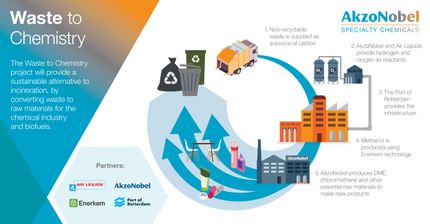Degussa: Breakthrough in hydrogen peroxide business
Degussa AG has achieved a far-reaching breakthrough in its hydrogen peroxide business (H2O2). According to the company, with an annual capacity exceeding 550,000 tonnes, the specialty chemicals company is the world's second-largest producer of this environmentally-compatible bleaching and oxidization agent. Degussa's hydrogen peroxide activities are a significant growth field of its Building Blocks Business Unit, generating sales of 1.1 billion euros in 2005 with around 4,500 employees.
Together with the high-tech engineering company Uhde, Degussa has developed an innovative process for producing pro-pylene oxide (PO) from H2O2, the so-called HPPO process. The Korean company SKC, Seoul, has now acquired a license for this. SKC is to bring a HPPO facility on stream at its site in the Korean town of Ulsan at the beginning of 2008 with an annual capacity of 100,000 tonnes. The Korean chemical company intends the facility to service the strongly growing demand for PO in the Asian market. PO is a raw material for polyurethane, which is used in car fittings and seat upholstery, for example.
DegussaHeadwaters Korea - a joint venture in which Degussa and the American company Headwaters, Inc., each holds 50 percent - will exclusively supply the new PO facility in Ulsan with hydrogen peroxide. To enable this the joint venture is acquiring a hydrogen peroxide facility in Ulsan from the Finnish company Kemira Oyj, Helsinki. The transaction remains subject to regulatory approvals. DegussaHeadwaters Korea will more than double the annual capacity of this facility from its current 34,000 tonnes.
Parallel to this progress now achieved, Degussa is also working on another milestone with Headwaters, namely the catalytic direct syn-thesis of H2O2 (DSHP). This DegussaHeadwaters direct synthesis process will be commercially available starting 2007. The combination of the HPPO process with DSHP offers additional cost advantages over conventional propylene oxide manufacturing processes.
Topics
Organizations
Other news from the department business & finance

Get the chemical industry in your inbox
By submitting this form you agree that LUMITOS AG will send you the newsletter(s) selected above by email. Your data will not be passed on to third parties. Your data will be stored and processed in accordance with our data protection regulations. LUMITOS may contact you by email for the purpose of advertising or market and opinion surveys. You can revoke your consent at any time without giving reasons to LUMITOS AG, Ernst-Augustin-Str. 2, 12489 Berlin, Germany or by e-mail at revoke@lumitos.com with effect for the future. In addition, each email contains a link to unsubscribe from the corresponding newsletter.
Most read news
More news from our other portals
See the theme worlds for related content
Topic world Synthesis
Chemical synthesis is at the heart of modern chemistry and enables the targeted production of molecules with specific properties. By combining starting materials in defined reaction conditions, chemists can create a wide range of compounds, from simple molecules to complex active ingredients.

Topic world Synthesis
Chemical synthesis is at the heart of modern chemistry and enables the targeted production of molecules with specific properties. By combining starting materials in defined reaction conditions, chemists can create a wide range of compounds, from simple molecules to complex active ingredients.


























































